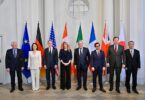Monitoring Desk
AUCKLAND: New Zealand Prime Minister Jacinda Ardern has used her Harvard University Commencement address to speak out against the “scourge of disinformation” and echo former Pakistan prime minister Benazir Bhutto’s call to deepen democracy.
Ms Ardern was honoured by the storied US university on Thursday, when she addressed more than a thousand students from the same stage offered to leaders of nations and industry including Winston Churchill, Angela Merkel, Steven Spielberg and Oprah Winfrey.
She received a rapturous reception as she spoke of New Zealand’s gun law reform and abortion decriminalisation – two hot-button issues in the United States.
Ms Ardern’s address was built around the need for democratic systems and informed debate, invoking the same plea from Benazir Bhutto, who underscored the “fragility” of democracy in her own 1989 address at the university.
“This imperfect but precious way that we organise ourselves, that has been created to give equal voice to the weak and to the strong, that is designed to help drive consensus – it is fragile,” Ms Ardern said.
“For years it feels as though we have assumed that the fragility of democracy was determined by duration.
“That somehow the strength of your democracy was like a marriage; the longer you’d been in it, the more likely it was to stick.
“But that takes so much for granted.”
Ms Ardern has walked a similar path to Ms Bhutto; the pair were the first two female heads of government to give birth while in office, Ms Ardern doing so on Ms Bhutto’s birthday.
The pair met in Switzerland in June 2007, just before Ms Ardern’s election to parliament and seven months before Ms Bhutto was assassinated.
“The path she carved as a woman feels as relevant today as it was decades ago, and so too is the message she shared here in this place,” Ms Ardern said.
Ms Ardern updated Ms Bhutto’s call for the 21st century, taking aim at online disinformation and calling on tech companies to do more to stop online conspiracy theories being spread, which can radicalise.
“The time has come for social media companies and other online providers to recognise their power and to act on it,” she said.
She finished her speech with a call for kindness, and to bridge differences with others.
“What we do as individuals in these spaces matters,” she said. “We are the richer for our difference, and poorer for our division.”
Introduced to squeals and applause from the crowd in the Tercentenary Theater, the centre of Harvard’s Yard in Cambridge, Massachusetts, Ms Ardern was even clapped during a water break.
“You know it’s a nice crowd when a drink of water elicits applause,” she said.
She received another cheer when she explained New Zealand’s parliament was 50 percent women, almost 20 percent Maori, and her deputy was “a proud gay man sitting among several other rainbow parliamentarians”.
But the biggest reception, and standing ovation, came at the mention of New Zealand’s banning of semi-automatic weapons, an initiative of Ms Ardern’s government following the 2019 Christchurch mosques attack.
Gun law reform is again at the forefront of American debate following this week’s massacre of 21 primary school students and staff in Texas.
As is tradition for commencement speakers, Ms Ardern was given an honorary degree, made a Doctor of Laws.
Afterwards, the Labour leader revealed technological woes plagued her address.
“About every 10 seconds the speech would disappear entirely for about three seconds a time,” she laughed.
“At a later date when I have managed to get over how stressful that situation was I might take it in a bit.”






